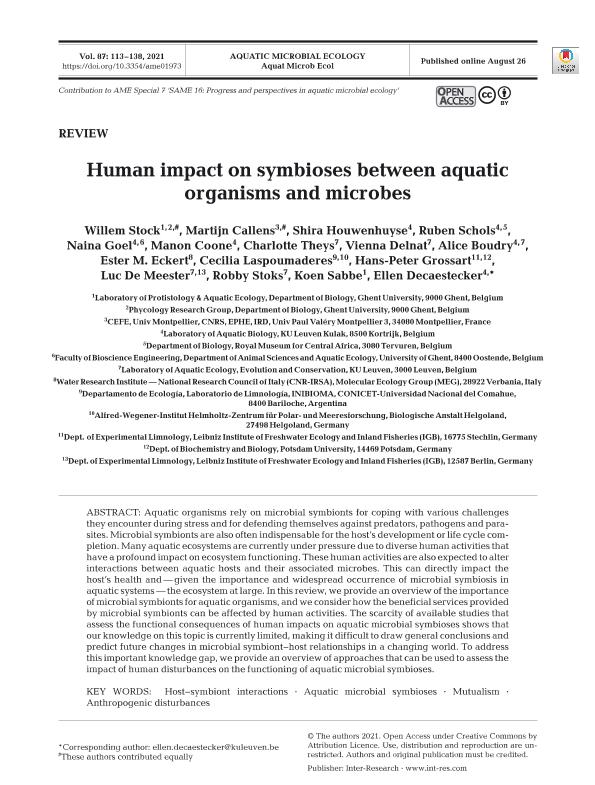Mostrar el registro sencillo del ítem
dc.contributor.author
Stock, Willem
dc.contributor.author
Callens, Martijn
dc.contributor.author
Houwenhuyse, Shira
dc.contributor.author
Schols, Ruben
dc.contributor.author
Goel, Naina
dc.contributor.author
Coone, Manon
dc.contributor.author
Theys, Charlotte
dc.contributor.author
Delnat, Vienna
dc.contributor.author
Boudry, Alice
dc.contributor.author
Eckert, Ester M.
dc.contributor.author
Laspoumaderes, Cecilia

dc.contributor.author
Grossart, Hans-Peter
dc.contributor.author
De Meester, Luc
dc.contributor.author
Stoks, Robby
dc.contributor.author
Sabbe, Koen
dc.contributor.author
Decaestecker, Ellen
dc.date.available
2023-01-10T14:22:30Z
dc.date.issued
2021-07
dc.identifier.citation
Stock, Willem; Callens, Martijn; Houwenhuyse, Shira; Schols, Ruben; Goel, Naina; et al.; Human impact on symbioses between aquatic organisms and microbes; Inter-Research; Aquatic Microbial Ecology; 87; 7-2021; 113-138
dc.identifier.issn
0948-3055
dc.identifier.uri
http://hdl.handle.net/11336/184154
dc.description.abstract
Aquatic organisms rely on microbial symbionts for coping with various challenges they encounter during stress and for defending themselves against predators, pathogens and parasites. Microbial symbionts are also often indispensable for the host's development or life cycle completion. Many aquatic ecosystems are currently under pressure due to diverse human activities that have a profound impact on ecosystem functioning. These human activities are also expected to alter interactions between aquatic hosts and their associated microbes. This can directly impact the host's health and - given the importance and widespread occurrence of microbial symbiosis in aquatic systems - the ecosystem at large. In this review, we provide an overview of the importance of microbial symbionts for aquatic organisms, and we consider how the beneficial services provided by microbial symbionts can be affected by human activities. The scarcity of available studies that assess the functional consequences of human impacts on aquatic microbial symbioses shows that our knowledge on this topic is currently limited, making it difficult to draw general conclusions and predict future changes in microbial symbiont-host relationships in a changing world. To address this important knowledge gap, we provide an overview of approaches that can be used to assess the impact of human disturbances on the functioning of aquatic microbial symbioses.
dc.format
application/pdf
dc.language.iso
eng
dc.publisher
Inter-Research

dc.rights
info:eu-repo/semantics/openAccess
dc.rights.uri
https://creativecommons.org/licenses/by/2.5/ar/
dc.subject
ANTHROPOGENIC DISTURBANCES
dc.subject
AQUATIC MICROBIAL SYMBIOSES
dc.subject
HOST-SYMBIONT INTERACTIONS
dc.subject
MUTUALISM
dc.subject.classification
Ecología

dc.subject.classification
Ciencias Biológicas

dc.subject.classification
CIENCIAS NATURALES Y EXACTAS

dc.title
Human impact on symbioses between aquatic organisms and microbes
dc.type
info:eu-repo/semantics/article
dc.type
info:ar-repo/semantics/artículo
dc.type
info:eu-repo/semantics/publishedVersion
dc.date.updated
2022-10-06T13:14:10Z
dc.journal.volume
87
dc.journal.pagination
113-138
dc.journal.pais
Alemania

dc.journal.ciudad
Oldendorf
dc.description.fil
Fil: Stock, Willem. University of Ghent; Bélgica
dc.description.fil
Fil: Callens, Martijn. Université Montpellier II; Francia
dc.description.fil
Fil: Houwenhuyse, Shira. Katholikie Universiteit Leuven; Bélgica
dc.description.fil
Fil: Schols, Ruben. Katholikie Universiteit Leuven; Bélgica. Royal Museum for Central Africa; Bélgica
dc.description.fil
Fil: Goel, Naina. University of Ghent; Bélgica. Katholikie Universiteit Leuven; Bélgica
dc.description.fil
Fil: Coone, Manon. Katholikie Universiteit Leuven; Bélgica
dc.description.fil
Fil: Theys, Charlotte. Katholikie Universiteit Leuven; Bélgica
dc.description.fil
Fil: Delnat, Vienna. Katholikie Universiteit Leuven; Bélgica
dc.description.fil
Fil: Boudry, Alice. Katholikie Universiteit Leuven; Bélgica
dc.description.fil
Fil: Eckert, Ester M.. Consiglio Nazionale delle Ricerche; Italia. Istituto di ricerca sulle acque; Italia
dc.description.fil
Fil: Laspoumaderes, Cecilia. Consejo Nacional de Investigaciones Científicas y Técnicas. Centro Científico Tecnológico Conicet - Patagonia Norte. Instituto de Investigaciones en Biodiversidad y Medioambiente. Universidad Nacional del Comahue. Centro Regional Universidad Bariloche. Instituto de Investigaciones en Biodiversidad y Medioambiente; Argentina. Alfred-Wegener-Institut, Helmholtz-Zentrum für Polar- und Meeresforschung; Alemania
dc.description.fil
Fil: Grossart, Hans-Peter. Universitat Potsdam; Alemania. Leibniz - Institute of Freshwater Ecology and Inland Fisheries; Alemania
dc.description.fil
Fil: De Meester, Luc. Katholikie Universiteit Leuven; Bélgica. Leibniz - Institute of Freshwater Ecology and Inland Fisheries; Alemania
dc.description.fil
Fil: Stoks, Robby. Katholikie Universiteit Leuven; Bélgica
dc.description.fil
Fil: Sabbe, Koen. University of Ghent; Bélgica
dc.description.fil
Fil: Decaestecker, Ellen. Katholikie Universiteit Leuven; Bélgica
dc.journal.title
Aquatic Microbial Ecology

dc.relation.alternativeid
info:eu-repo/semantics/altIdentifier/url/https://www.int-res.com/abstracts/ame/v87/p113-138/
dc.relation.alternativeid
info:eu-repo/semantics/altIdentifier/doi/http://dx.doi.org/10.3354/ame01973
Archivos asociados
